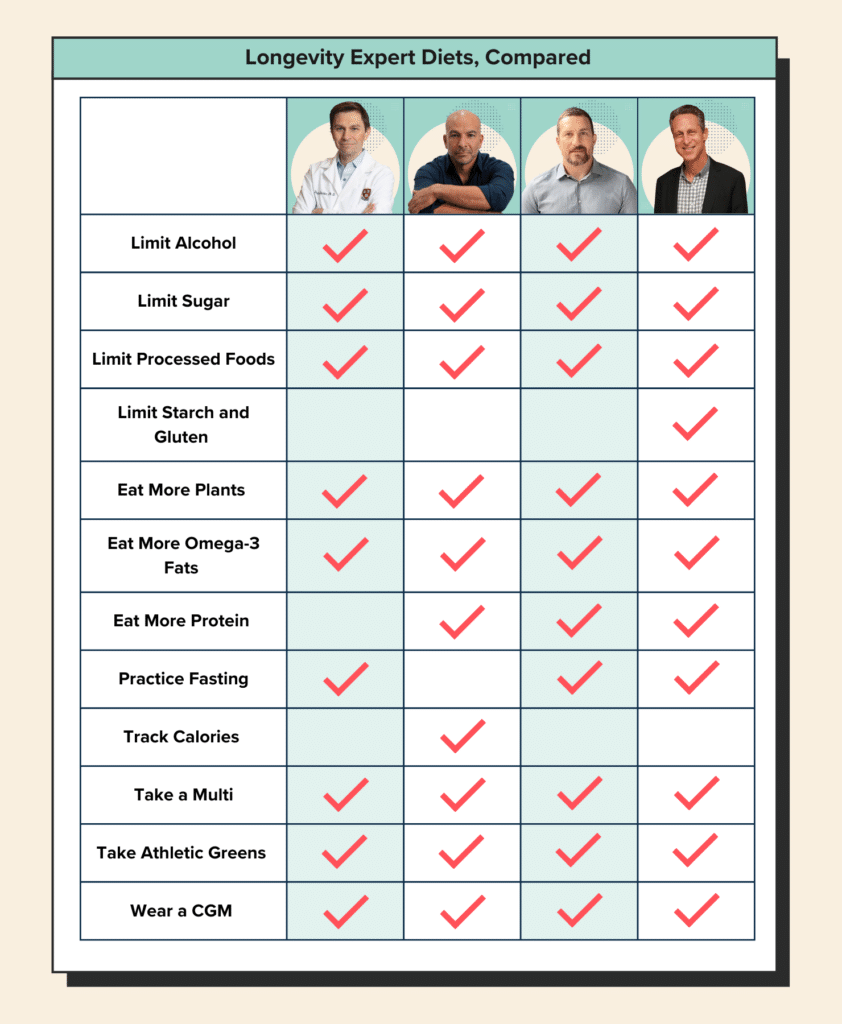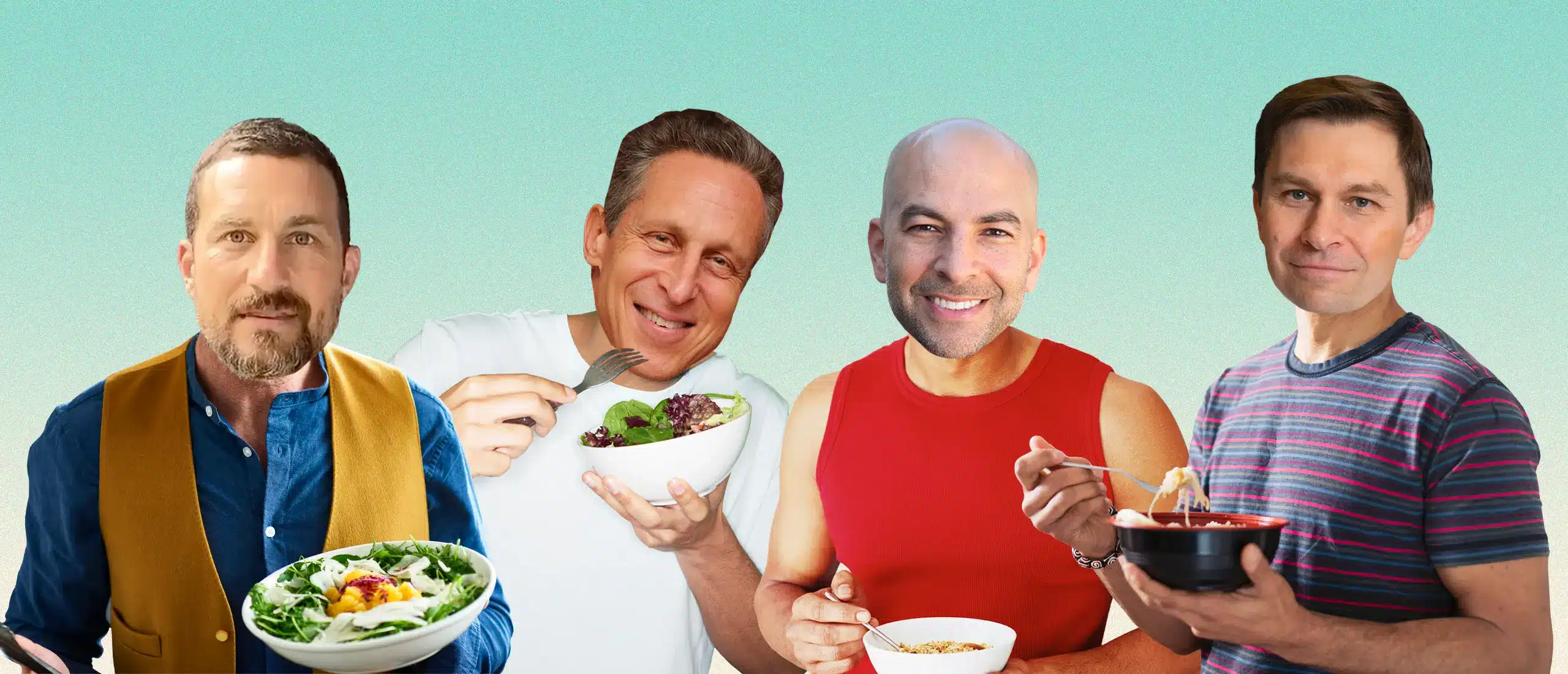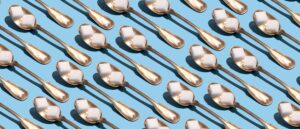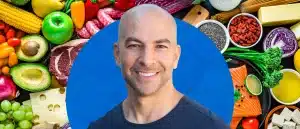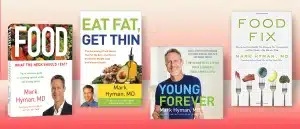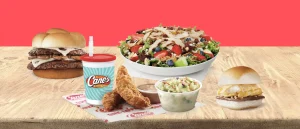Longevity Experts Swear By These Diets for a Longer, Healthier Life
We love a late-night Taco Bell Mexican Pizza (washed down with an icy glass of Coca-Cola) moment as much as the next guy. But lately, we’ve been indulging in cheat days a little less often. Why? The food on our plates doesn’t just fuel our bodies for today, it also has the power to optimize our health and lifespan—so we can live better for longer.
The only rub: Experts aren’t entirely in agreement on how to eat for longevity.
Longevity doctor Peter Attia, M.D. recommends the keto diet for some people and a low-fat diet for others. Harvard Medical School longevity researcher David Sinclair, Ph.D., and Stanford University neuroscientist Andrew Huberman, Ph.D. opt for intermittent fasting (IF). And functional medicine doctor Mark Hyman, M.D. and Sinclair hammer the Blue Zones’ plant-forward Meditteranean diet.
But peel back a few layers of the onion and you’ll find that these experts’ favorite diets all point back to one foundational principle: favorably altering the pool of genes associated with aging.
Eat badly, and these genes can accelerate aging and its associated diseases, like cancer, heart disease, type 2 diabetes, and dementia. Eat well and you might be able to reverse your biological age and ward off disease.
Below, the dietary principles all the experts agree on, plus a breakdown of exactly what each of them eats every day to fight aging.
Diet Advice Longevity Experts Agree On
Despite some differences of opinion, Attia, Huberman, Sinclair, and Hyman all get behind these four strategies:
Eat less
Whether through calorie restriction, dietary restriction (cutting out specific foods), or fasting (including intermittent fasting like 16:8 or extended fasting like a 48-hour fast), the experts concur that eating less can slow and reverse aging.
“Statistically speaking, about two-thirds of us are overnourished,” says Attia in his book Outlive. Excess body fat is linked to insulin resistance, inflammation, type 2 diabetes, cardiovascular disease, and cancer—all known drivers of aging. Putting fewer calories in the tank results in weight loss, and a healthier weight is linked to a longer lifespan (1).
Bonus: Eating less can trigger autophagy—a process that recycles damaged cell parts to enhance their performance (2), and keep you healthy, enhancing your healthspan (3).
While each expert tends to have their favorite method of eating less, they all agree that it matters much less how you eat less and more that you do it.
Hyman prefers to focus on dietary restriction, limiting known drivers of inflammation like alcohol (4), sugar (5), and gluten (6)—changes he suggests have a big payoff, even for the metabolically healthy. In his book Young Forever he also suggests to “take a 12- to 16-hour break from eating each day to induce autophagy.”
Sinclair makes an important point: “It’s not just about the period of eating, it’s the period of not eating that’s so important to boost the body’s defenses against aging to maximize longevity,” he says. By giving your body a break from processing food, Sinclair argues you give your body time to tap into autophagy. He recommends intermittent fasting, extended fasting, or a fasting-mimicking diet (crediting biologist Valter Longo) to achieve it.
Ditto Huberman. He’s been fasting for 12 to 16 hours per day for the last ten years. As he noted on an episode of Huberman Lab, IF has, “a very powerful and positive impact,” on “various health parameters” linked to a better healthspan, including increasing insulin sensitivity, decreasing blood pressure, lowering oxidative stress, and decreasing inflammation.
Attia agrees fasting can have powerful effects on autophagy, but he prefers caloric or dietary restriction methods. He argues that fasting often results in dipping below your protein needs and in turn losing precious muscle mass. Muscle is essential for maintaining fitness and function as you age, which is why he reserves fasting for his most extreme patients.
Cut the junk
Drop the Doritos. Processed food is linked to a shorter lifespan. “The elements that constitute the SAD (Standard American Diet) are almost as devastating to most people as tobacco when consumed in large quantities, as intended: added sugar, highly refined carbohydrates with low fiber content, processed oils, and other very densely caloric foods,” Attia wrote in Outlive.
On an episode of Huberman Lab, Huberman explains that everything you eat, as it travels from your mouth to your rectum, interacts with hundreds of thousands of cells along the way. This impacts how you feel—at both a physical and emotional level.
How to pick out what’s processed and what’s not? Attia follows the classic shop-the-rim of the grocery store rule (you tend to find more preservatives in the shelf-stable items in the center of the store). Hyman asks himself: did God make this or man? “Did God make a Twinkie, no. Did God make an avocado, yeah,” he said on The School of Greatness Podcast. Sinclair simply suggests eating less sugar less often.
Huberman, on the other hand, avoids cravings thanks to testosterone replacement therapy. “One very traumatic effect of taking, what I would say is, a very low dose of TRT since the new year is absolutely zero appetite for sugar or any foods that you would consider junk or processed foods,” Huberman told More Plates More Dates.
Hone’s at-home testosterone assessment is the simplest way to uncover whether your levels are low. If you qualify for treatment, TRT can be sent right to your door.
Use a continuous glucose monitor
Another thing longevity experts agree on: using tools that can keep healthy people healthy. The latest in their lineup is a continuous glucose monitor (CGM). CGMs were originally developed and used for people with type 2 diabetes but our longevity experts argue it’s essential for healthy people to learn how our bodies respond to different foods.
“Knowing your blood sugar levels is one of the most important components of creating optimal health,” Hyman told Levels.
Saying continuous glucose monitors are only for diabetics is like saying bathroom scales are only for the obese #wellness
— David Sinclair (@davidasinclair) July 14, 2021
Depending on your metabolism, specifically your insulin sensitivity, your tolerance to carbs is likely different from that of your neighbor, friend, or spouse. For example, when Sinclair first started using a CGM, he quickly learned that rice spiked his glucose through the roof. Potatoes weren’t so bad.
“The power of CGM is that it enables us to view a person’s response to carbohydrate consumption in real-time and make changes to rapidly flatten the curve and lower the average,” Attia wrote in Outlive.
Drink less
“Alcohol serves no nutritional or health purpose but is a purely hedonistic pleasure that needs to be managed,” Attia wrote in Outlive. Although he enjoys a quality sip of wine or tequila, he does so in moderation: “If you drink, try to be mindful about it. You’ll enjoy it more and suffer fewer consequences,” he says. He advises no more than seven drinks per week, and staying under two drinks per day.
“Even low to moderate alcohol consumption negatively impacts the brain and body,” Huberman said on Huberman Lab. The less alcohol the better, he says. Hyman agrees, recommending a maximum of two to three drinks per week.
Chronic alcohol consumption increasingly seen as damaging to the brain. This paper says liquor accelerates epigenetic age in youths https://t.co/zaQJw4q3ad
— David Sinclair (@davidasinclair) January 10, 2023
All three experts point to research that alcohol is a potent carcinogen (7), is associated with inflammation which is linked to cardiovascular disease, Alzheimer’s, and everything in between (8), and slows fat oxidation (9)—the exact opposite of what you want if you’re trying to lose fat.
Much of Sinclair’s research has focused on the inflammation-fighting polyphenol compounds in red wine—like resveratrol. But even he admits that too much alcohol is a net negative for longevity, opting to get his resveratrol from supplements rather than wine.
Eat Like David Sinclair
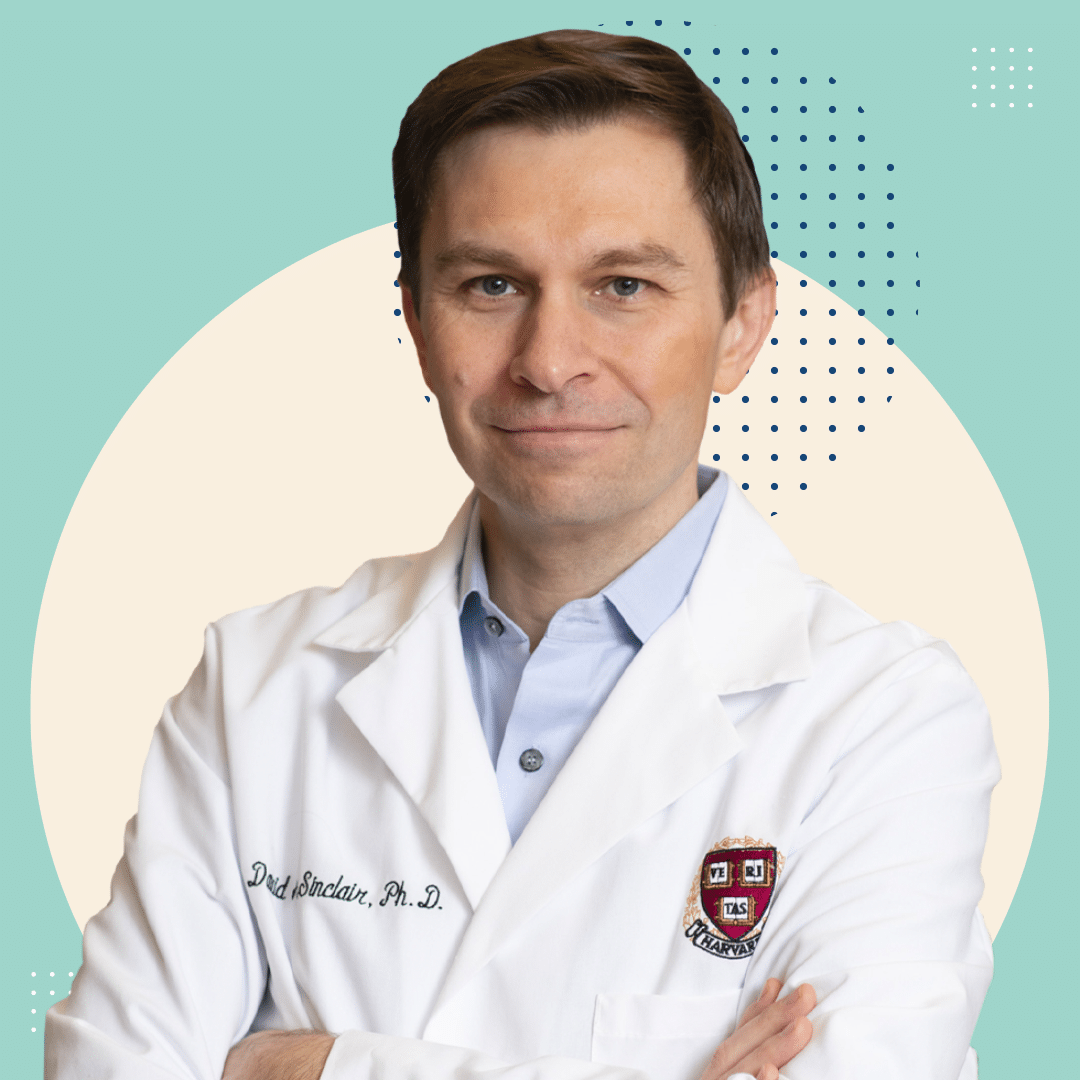
Sinclair claims his diet is one reason why he passes as 42 on a biological age test, even though his ID pegs him as 53. In favor of autophagy, Sinclair does the following:
- Eats less meat. In an episode of Lifespan, he explains that eating too much protein, especially from sources high in branched-chain amino acids (BCAAs) like meat, can chronically elevate the gene mTOR. When mTOR is activated you build muscle, but when it’s suppressed you trigger autophagy.
- Follows a 20:4 intermittent fasting schedule—where he skips breakfast and lunch, saving his appetite for a “really enjoyable, big dinner” at the end of the day.
- Reduces feelings of hunger early in the day by drinking plenty of water, downing an Athletic Greens (AG1) for energy, and pairing his vitamins with a little bit of fat like olive oil or yogurt to help with the absorption of fat-soluble vitamins A, D, E, and K.
- Eats plant-based Mediterranean for his one big meal a day. Rich in organic, local, colorful produce, this diet contains higher levels of antioxidants, which activate your sirtuin genes (10)—which play an important role in autophagy.
- Avoids sugar, leaning on sugar-free alternatives to add sweetness to his food. When he does eat sugar, he expertly eats it after a balanced meal to reduce glucose spikes.
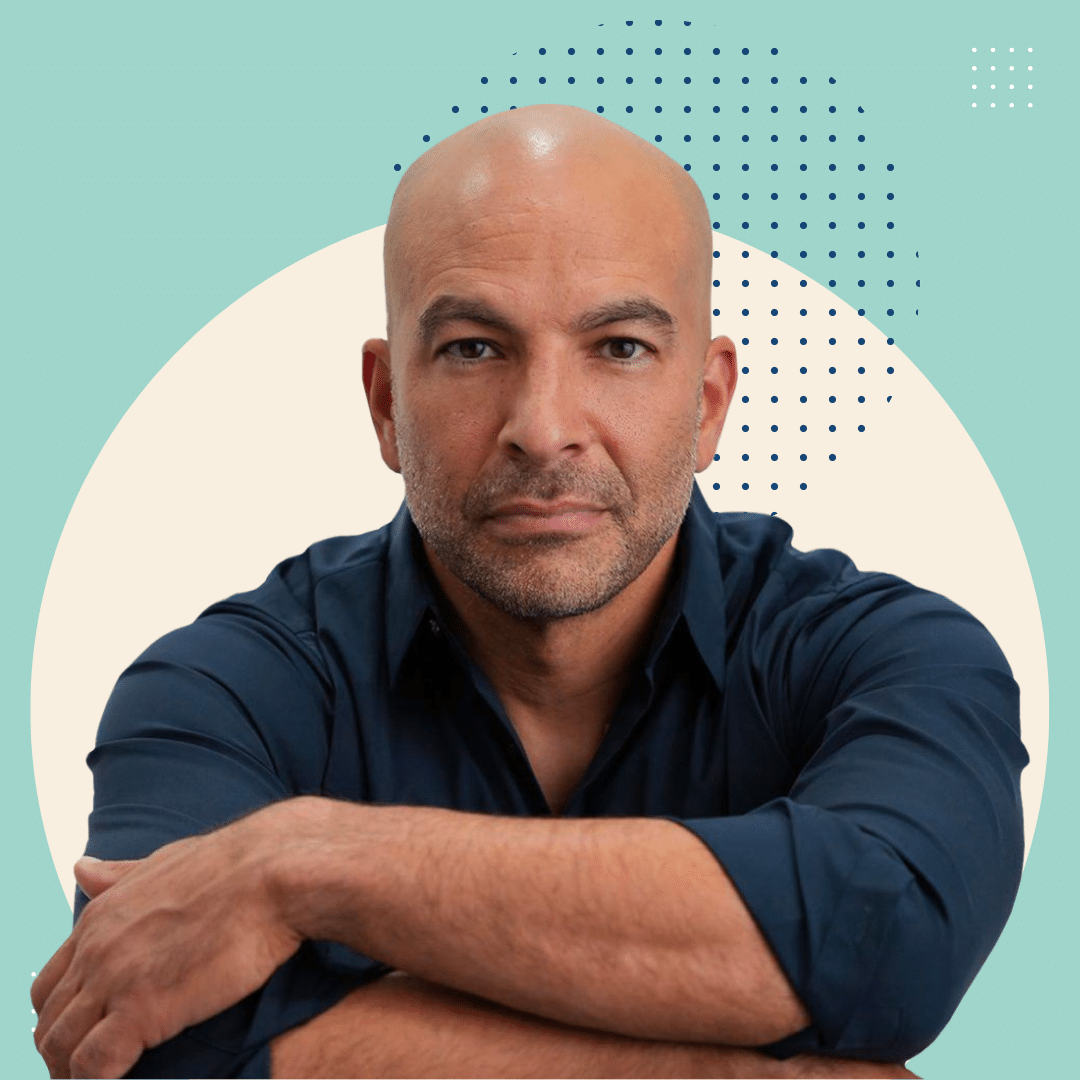
Attia has tried nearly every diet under the sun—low-carb, keto, time-restricted feeding, and extended fasting. He’s landed somewhere in no man’s land. In a recent episode of his podcast, The Drive, he explains his current goals are to increase muscle mass and reduce body fat—since muscle mass is critical for being able to do the things you want to do in your bonus decades.
Here is his approach to hitting this worthy goal:
- Eat 1 gram of protein per pound of body weight
- Eat 2,700 to 2,800 calories per day (based on his personal caloric needs)
- Track protein and calories via the Carbon app
For Attia, this breaks down to around 45 to 50 grams of protein four times per day, which looks something like this:
- Breakfast: 8 eggs (4 whole, 4 whites) with toast and butter
- Snack: Protein shake made of 24 ounces of almond milk, 50 grams of protein powder, and frozen fruit
- Lunch: Chicken salad with a variety of vegetables, olive oil, and balsamic vinegar
- Dinner: Varies
When it comes to dietary claims or suggestions, Attia swerves putting his eggs in one basket. “Everyone’s metabolism is different. Some people will lose tremendous amounts of weight and improve their metabolic markers on a low-carbohydrate or ketogenic diet, while others still will actually gain weight and see their lipid markers go haywire,” he explains in Outlive. He suggests experimenting to find what works best for you.
Eat Like Mark Hyman
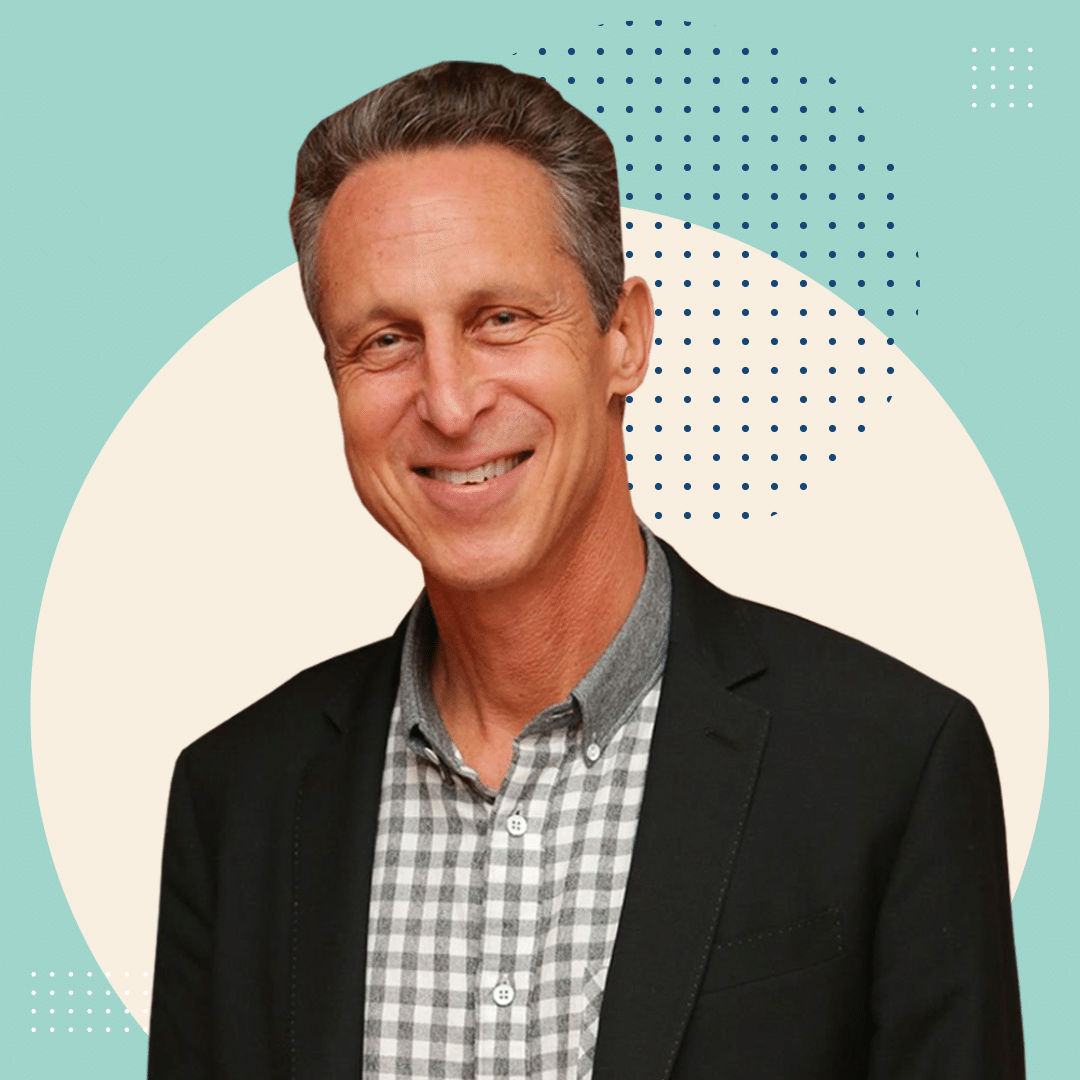
Hyman abides by the “food is medicine” mantra, relying heavily on dietary interventions paired with other healthy habits like exercise, sleep, and a panel of supplements. True health isn’t marked by losing a few pounds or the absence of disease, but by “feeling good, showing up, and giving your best gifts to the world.”
Hyman suggests his self-coined paleo-vegan diet which he introduced in his book The Pegan Diet. The diet focuses on plates packed with 75 percent veggies, enough protein, and omega-3 fats; while limiting starchy veggies, fruit, gluten, sugar, and alcohol.
His recommendations involve three simple food principles:
- Limit processed foods especially starch, gluten, sugar, and alcohol
- Eat a “plant-rich” diet, making 75 percent of your plate vegetables, nuts, seeds, and fruit
- Get enough healthy fats like avocados, olive oil, fatty fish, and grass-fed animal products
As for supplements, he has an entire chapter’s worth of suggestions in his book Young Forever. For general health, he recommends:
- Omega-3: 1 to 2 grams a day, Dutch Harbor Omega by Big Bold Health
- Multivitamin and mineral: Multi t/d or Polyphenol Nutrients by Pure Encapsulations
- Magnesium: 200 to 600mg a day, Magnesium Glycinate or Magnesium Citrate by Pure Encapsulations
- Probiotics: Probiotic 50B by Pure Encapsulations
More Hyman
Eat Like Andrew Huberman

Huberman’s dietary habits have been consistent for the past 10 to 15 years. “I think I found a diet that works well for me, obviously it will look different for different people, but this is what allows me to be consistent in eating quality foods,” he said on More Plates More Dates. Here’s how he breaks an average day down:
- Waits 90 to 120 minutes after waking to drink coffee. When you wake up, he says, you have a healthy increase in cortisol and adenosine. Drinking caffeine can block adenosine, leading to a big afternoon crash.
- He also usually skips breakfast. “I sort of fast until about noon and then I eat a low-carb meal,” he told More Plates More Dates. That’s usually some steak or ground beef, some Brazil nuts, and a vegetable.
- If he does a hard workout in the morning, he pregames with some LMNT electrolytes and Anna Park Yerba Mate loose-leaf tea. To recover muscle glycogen after, he has a few scoops of whey protein (usually unflavored from Momentous) and fruit or oatmeal with a pat of butter.
- Takes probiotics and omega 3’s. Athletic Greens is his main source of probiotics to boost gut health. He also takes 2 grams of Thorne Super EPA per day and occasionally drizzles his oatmeal with Carlson’s Lemon Fish Oil for a boost.
- In the afternoon, he snacks on macadamia nuts, almonds, or a whey protein shake.
- For dinner, Huberman prefers a meal that’s starch-heavy and protein-light. Too much protein before bed seems to mess with his sleep, and the extra carbs give him ample energy for his fasted workouts the next morning.
